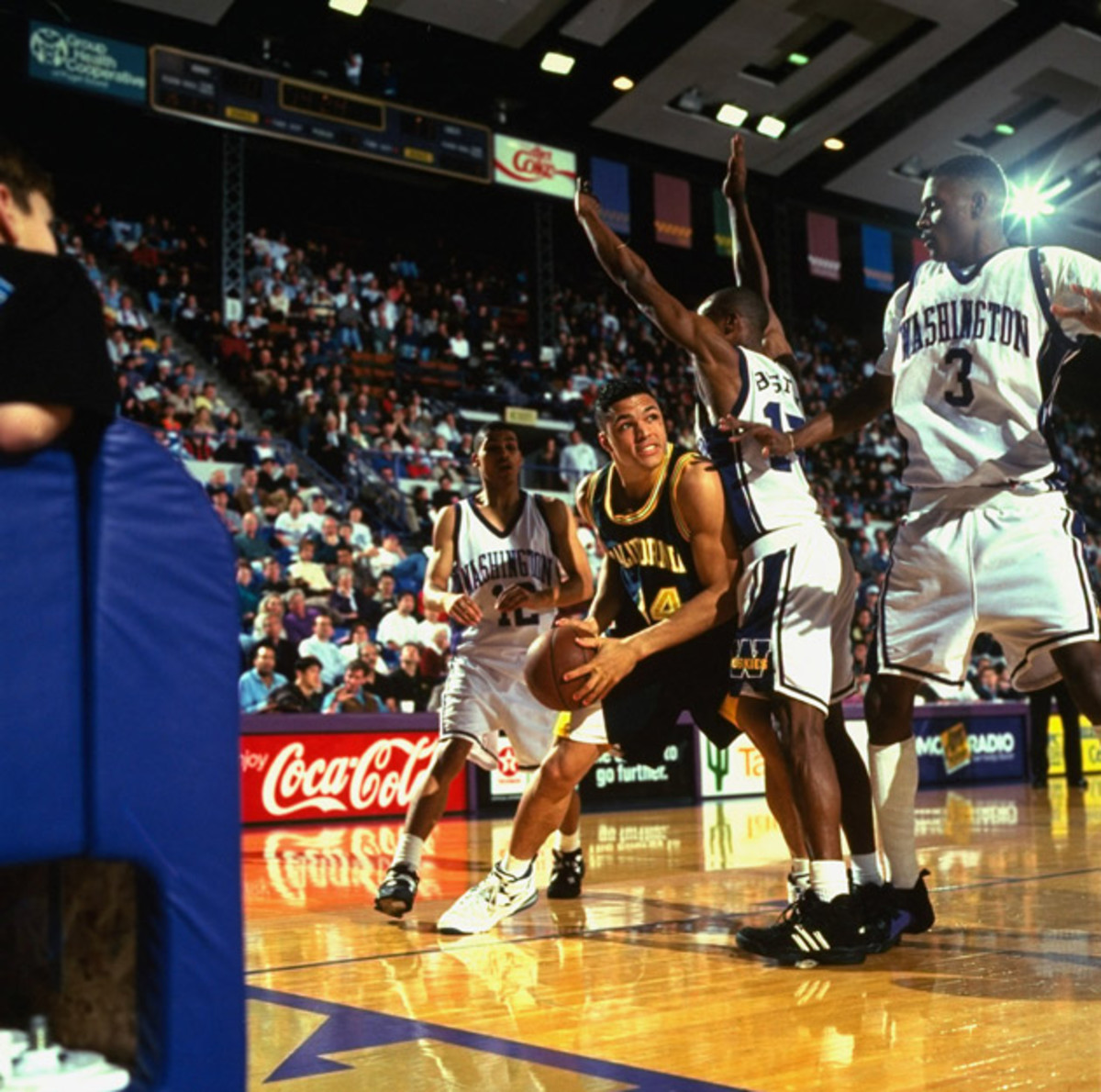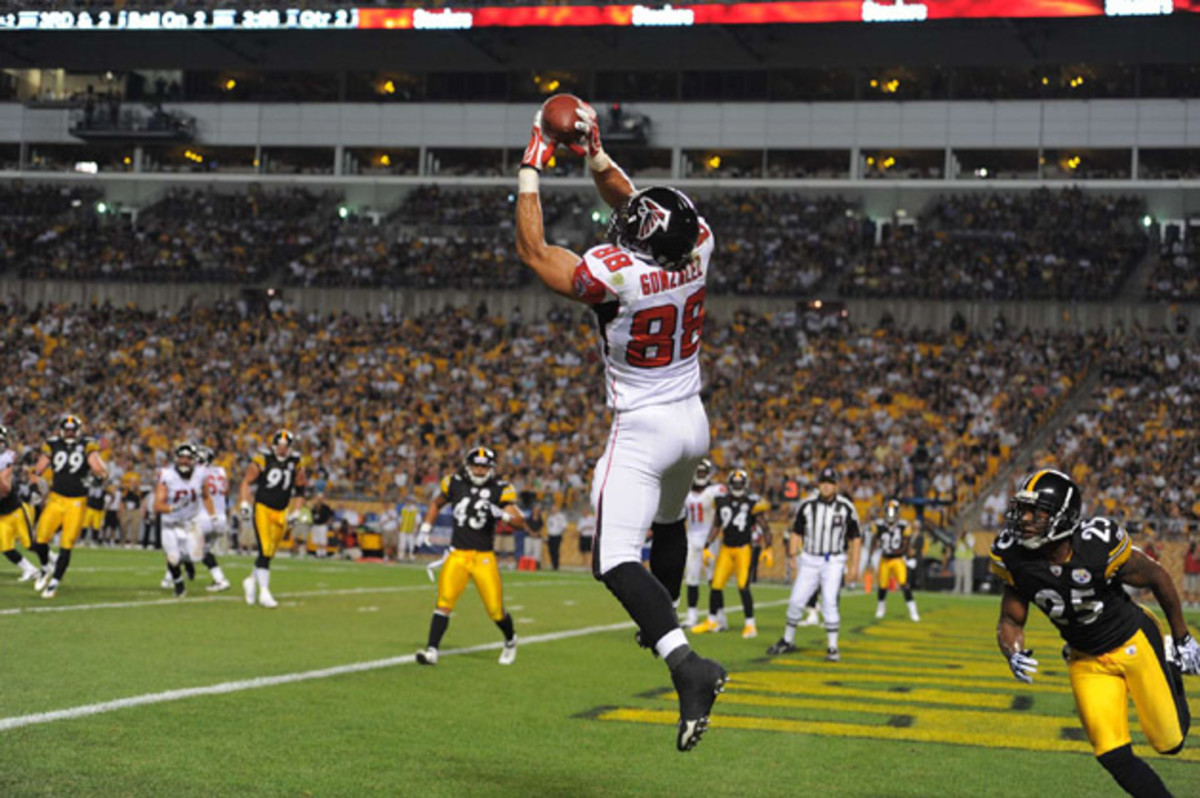Tony Gonzalez on Retirement, Staying Healthy and the Next Chapter

The end of a 17-year NFL career means a lot of changes. Future Hall of Fame tight end Tony Gonzalez has found that those changes are both positive and negative. Gonzalez spoke with Edge about adjusting his diet, workout routine, profession and even some of the words that come out of his mouth now that he’s stepped away from the game.
How has your exercise routine changed now that you’re no longer in the NFL?
To play in the NFL you've got to lift weights. You've got to be strong. I went from working out with 120-130 pound dumbbells down to 70-pound dumbbells, and I won't go up. I'll just do more reps now. Higher reps, less weight. I think my body is reflecting that. I'm not as big, because I'm not as strong as I used to be.
What was the most effective part of your training regimen when you were actively playing in the league?
My thing is this: Instead of lifting weights, I'd rather go play basketball. I have a half court in my backyard so I'm able to play basketball a lot. I don’t really like being in the weight room … with basketball you're always in shape. I never got tired when I went out on the football field. The quickness, the stop, jumping cutting, right hand, left hand coordination, I think it's the best exercise you can do to cross train for football. I always tell offensive linemen that I can't think of a better exercise for you to increase your agility or to help your lungs.

Did you ever worry about getting hurt playing basketball?
It was a risk. But to me it made me the player I was. I did it all the time. I never stopped. They tried to get me to stop. They put it in my contract and everything. Basketball is me. I was never going to stop it. I didn't care. If I tore my ACL, so be it.
You’re well known for having a super-healthy diet. What’s in your fridge right now?
Right now, it’s [primarily] plant-based, but I still eat meat. I was a vegan for about a month but that was it. I eat chicken. I eat beef. I eat pork. I try to stay away from the processed meat like bacon, and then eat it from a good source like grass-fed beef. Sustainable foods — not processed foods. I just try to keep a good balance and be smart and try to listen to my body, what makes me feel good after I eat and what doesn't make me feel good.
RELATED: Hey, Arian Foster—Where's the Beef? Going Vegan in the NFL
You're one of the most notable advisors on the popular fitness app, FitStar. But were you always this healthy or did you have to make adjustments to your diet?
It evolved. My first ten years in the league, you name it, I ate it. Fried chicken, fast food, Big Macs. Whatever I felt like eating I was going to eat it without repercussion as far as I was concerned… Going into my tenth year I read the book China Study. It changed my whole way of thinking. Changed my life. It added years to my career. I really believe that it helped me perform better.
Did you try to push your diet on your teammates?
Absolutely. I tried to push it on them because I care about them. They probably thought I was nagging on them, and maybe I was. They made fun of me too because we'd be in line and they'd go for the steaks and the big pieces of beef, chicken with cheese. They'd call me “China Study,” and “little man.” Everyone was making fun of me. They were thinking that I was going to eat my way out of the league. But now when I got older people started seeing my longevity, I think guys started waking up and thinking, “He may be on to something here.” I'd get a lot of guys calling me from other sports. I'd get professional baseball players, basketball players, coaches calling me saying, “Hey, do you mind talking to my guy and guys on the team too?” They'd always look at what I would take when we'd get in line and they'd start to do it themselves.

What’s it like to retire after so many years in the league?
It's scary as hell, and it should be for every player out there. I don't care what anybody says. You’re taking away something you've been doing since you were 12 years old. I don't care if you're [in the NFL] for one week or if you're there for 17 years like me. Eventually it's going to end. Eventually you're going to have to figure out what else you can do. I don't care how much money you have. It's got nothing to do with money. You have to go out there and find a passion again. You have to find a purpose again… It's scary. What else do I do? What else am I qualified for? Do I really want to go to a 9-to-5 job? Is that me? I have no experience now because I've thrown everything I have into this one sport. But now I have to switch and do something totally foreign to me. That's something I've tried to prepare myself for.
RELATED: Speed It Up: Carlos Hyde's Plan to Improve his 40
Speaking of preparation, you’ll be joining the NFL Today crew on CBS this season. What do you have to do to get ready for your new gig?
I need to practice my delivery, how I get that information across to the people that are watching and working with my colleagues at the desk. Making sure that we're gelling and the chemistry is there. That's what I need to work on. I practice on my own in front of the mirror. I'm an OCD type of person. You'll hear me talking in the shower a lot if you live with me.
Are you excited that you no longer have to bite your tongue?
That's going to be the best part about it. I asked Boomer [Esiason], I said, “How do you walk that line?” Because as a player I believe you have to. My wife is my biggest critic, she was like, “Are you going to be able to be honest with people?” Because she hates how politically correct I am sometimes. I feel personally you have to be politically correct while you're playing. I'm not going to call out players on my team or the other team or in the league or the owners. Now, I get paid to do that. That's how you justify it. That’s what Boomer told me, other people, [Michael] Strahan included. You get paid to give your opinion and you come up with your own style. I don't think my style is going to be an angry person on TV calling people out, launching missiles at people. I'm just going to call it like I see it and try to give a good critique. If I'm going to shy away from that [spotlight], I probably shouldn't be working in this space. I should be doing something else.
